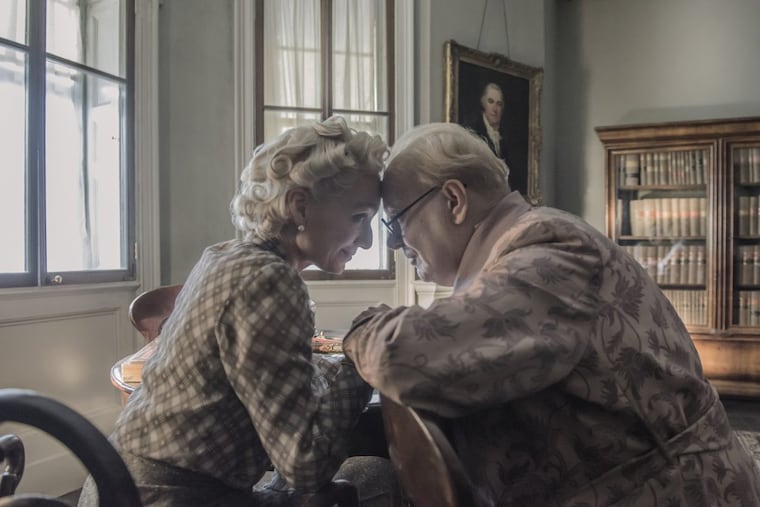'Darkest Hour': Gary Oldman's unexpectedly bright and buoyant profile of Winston Churchill
Gary Oldman makes a first-rate Winston Churchill in Joe Wright's 'Darkest Hour.'

Darkest Hour turns out to be a misleading title for Joe Wright's new movie about Winston Churchill, which is a surprisingly buoyant look at Britain's celebrated political leader in the dire early days of World War II.
The opening scene sets an unexpected comic tone. With Europe on the verge of all-out war, leaders of Churchill's party, ensconced in an actual smoke-filled room, are looking to form a government and fill the prime minister's position, at the time the most important job vacancy in the free world.
Argument reduces a list of politically viable choices to a single likely selection.
One man speaks, capturing the mood of all: Oh, no.
Cut to Churchill's home, where the kitchen is preparing his customary meal of steak, eggs, and whiskey. We like him already.
Upstairs, off camera, Churchill blusters, but nobody takes him seriously. The staff, instead, takes its cues from his unimpressed wife (played by Kristen Scott-Thomas). The voice belongs to Gary Oldman, who plays Churchill with an obvious relish and a sense of fun that the viewer feels and shares almost instantly.
He makes an off-color entrance — in his bedroom, greeting a female subordinate (Lily James) with a carelessly secured bathrobe. Because we're instantly on Oldman's side, the scene gets a laugh even in these times of bathrobe scandals. (It helps that whatever James sees causes her to laugh as well.)
The breakfast in Churchill's home is his last as a parliamentarian. He soon learns that he's to be prime minister, and is whisked off to meet with important members of Parliament — including peace-minded adversaries within his own party, Neville Chamberlain (Ronald Pickup) and Viscount Halifax (Stephen Dillane). Later, he's summoned to meet the king (Ben Mendelsohn), an uptight fellow who greets Churchill as if afraid he'll contract infectious vulgarity.
Darkest Hour whisks through these scenes, set to the ticking clock of the Dunkirk evacuation (also dramatized this year in Christopher Nolan's Dunkirk and Lone Sherfig's Finest Hours). Wright directs with his customary showmanship. As politicians talk about war and peace on a circular table, Wright mounts a camera in the middle, spinning to capture the choreographed dialogue as it moves from man to man around the perimeter.
Read more: Why Gary Oldman never wanted to play Winston Churchill, and how 'Darkest Hour' changed his mind
In Parliament, he shoots from drastic angles, adding dramatic shafts of light to give his interior compositions added dimension. Wright's restlessness can be off-putting, but his technique feels like a reasonable match here for the high-stakes subject matter, and the heightened (but not hammy) pitch of the performances.
Oldman has the plum role, but Dillane, with his mouth full of aristocratic marbles, has fun too with Viscount Halifax, the country's most forceful advocate for a peace deal, eager to cast Churchill's attack on appeasement as war-mongering.
Oldman has described Churchill is one of history's indispensable men, and the movie has echoes of Stephen Spielberg's Lincoln, whose subject was just as indispensable to the resolution of America's own great moral and military crisis.
Both men loved words, had a genius for writing, and in Churchill's case a sense of the theatrical, captured by Oldman. Churchill, by way of Darkest Hour, hands the actor some of the best speeches of his career, and Oldman brings them vividly to life.